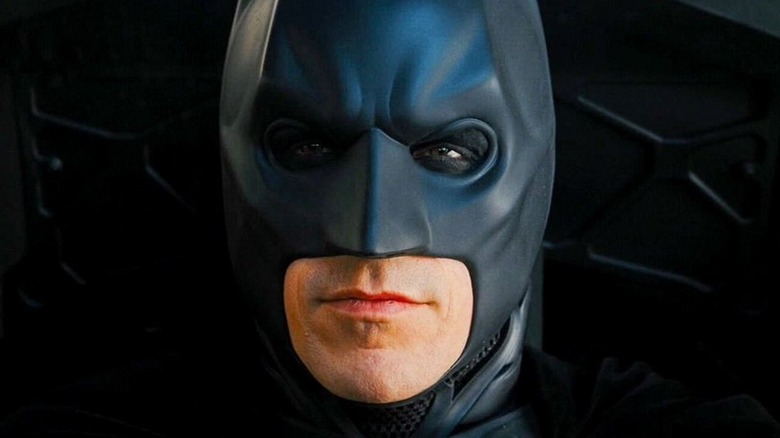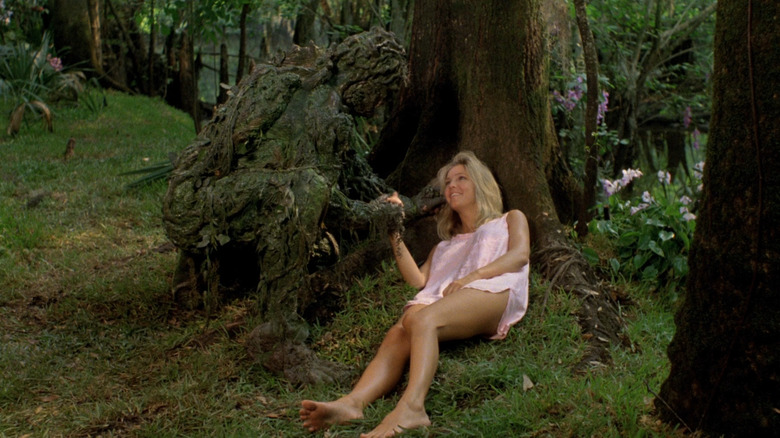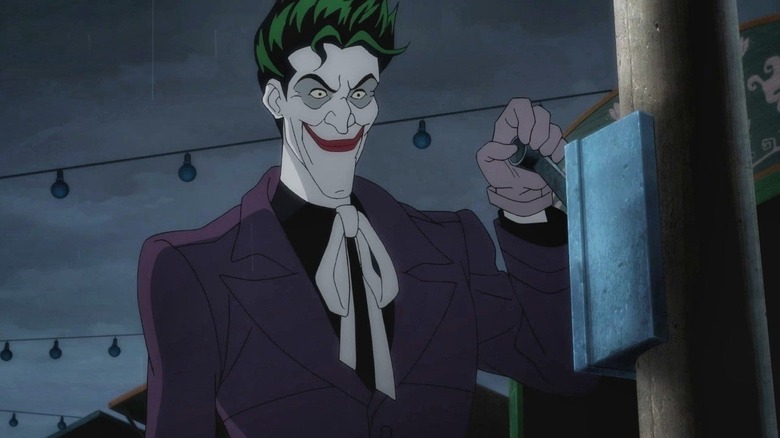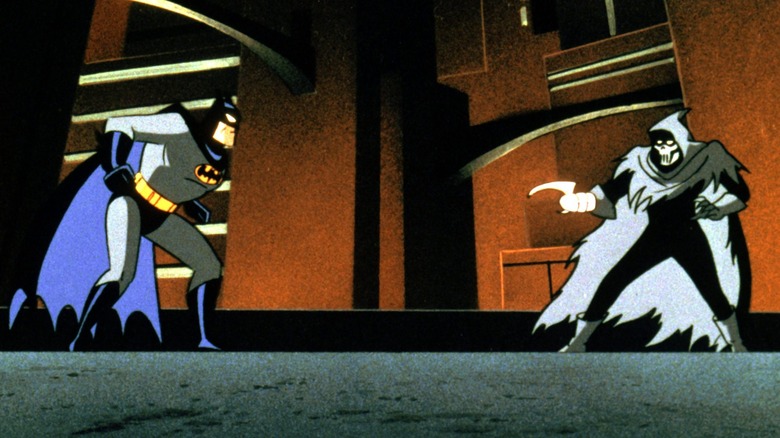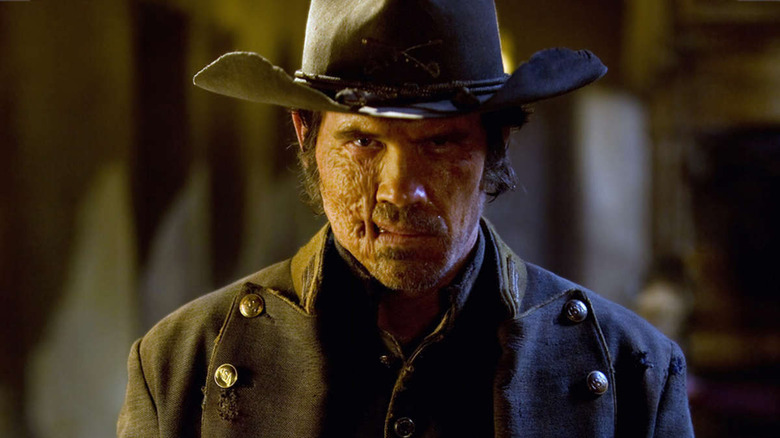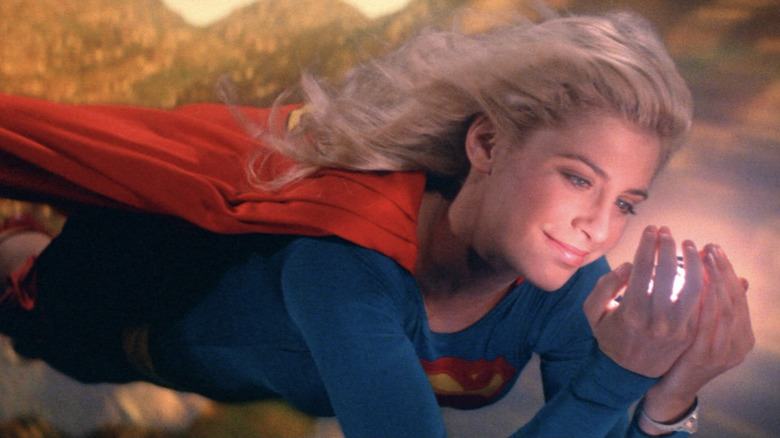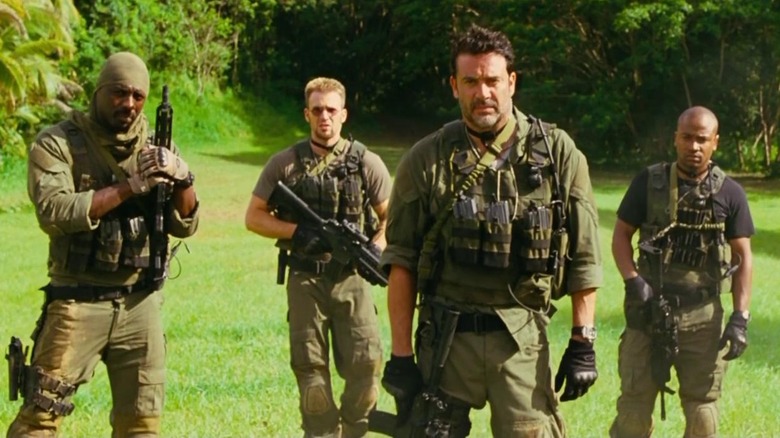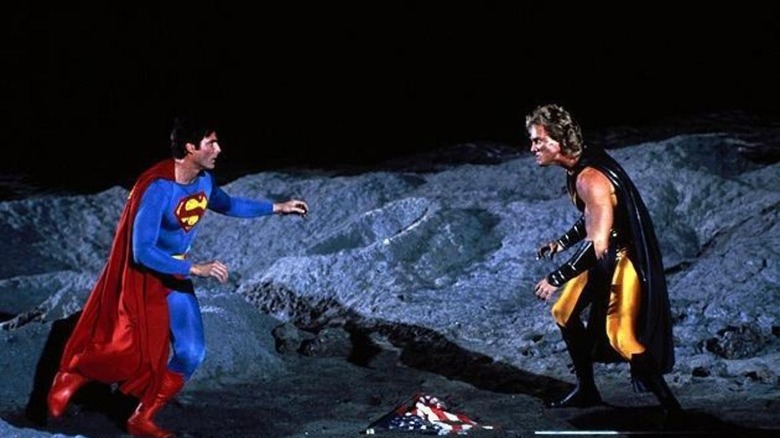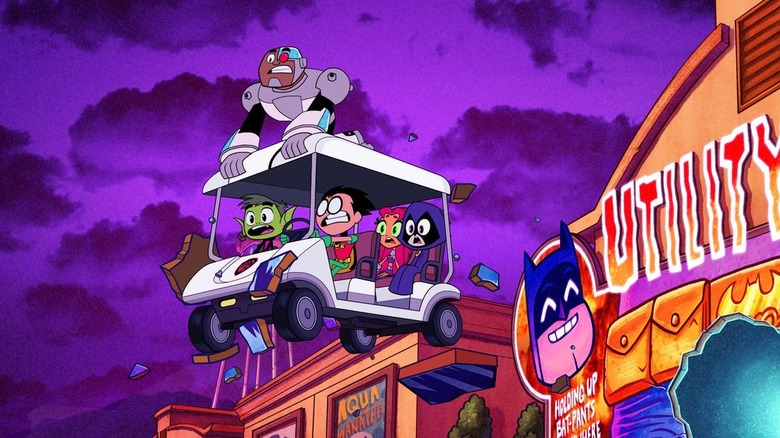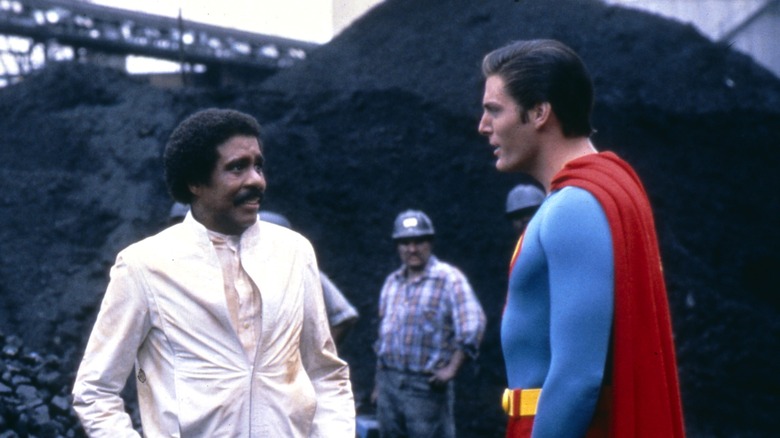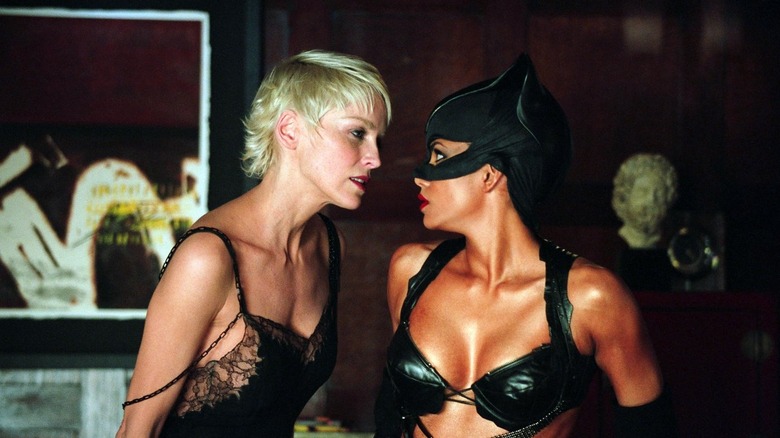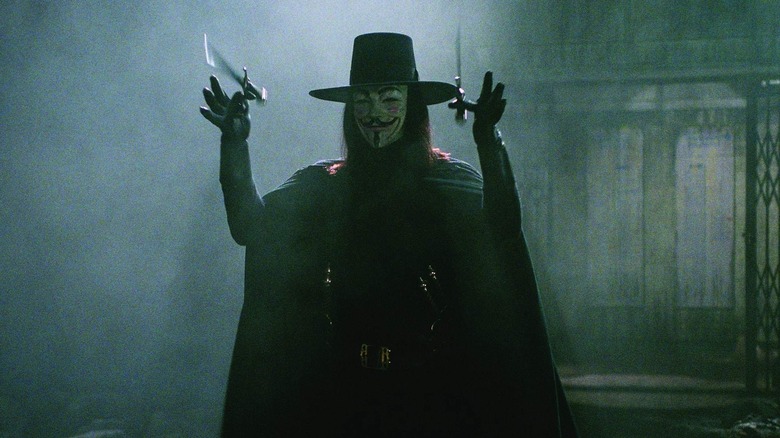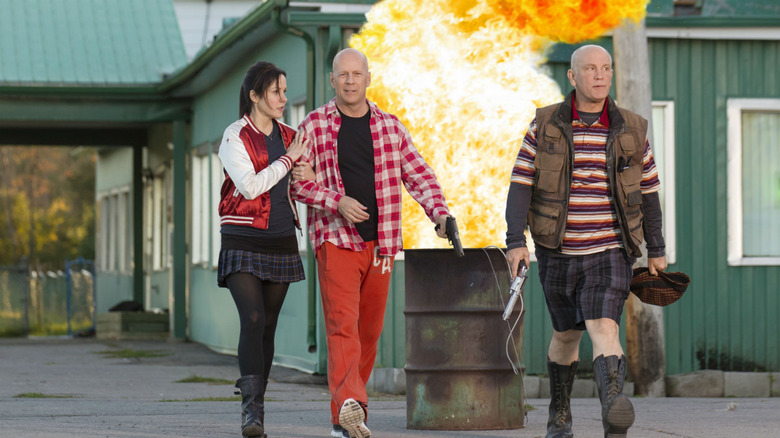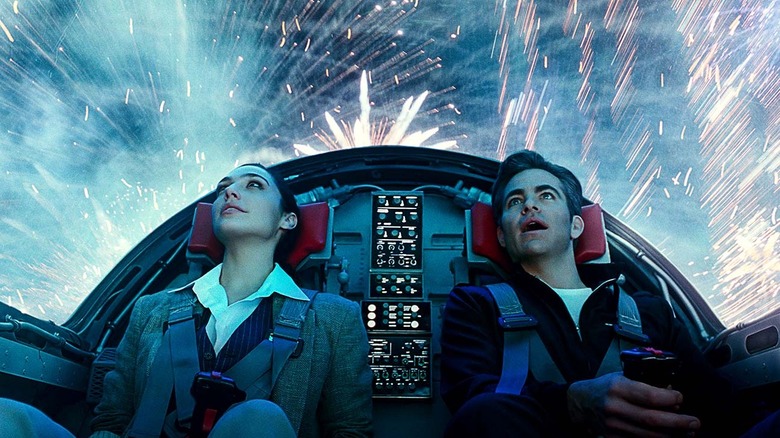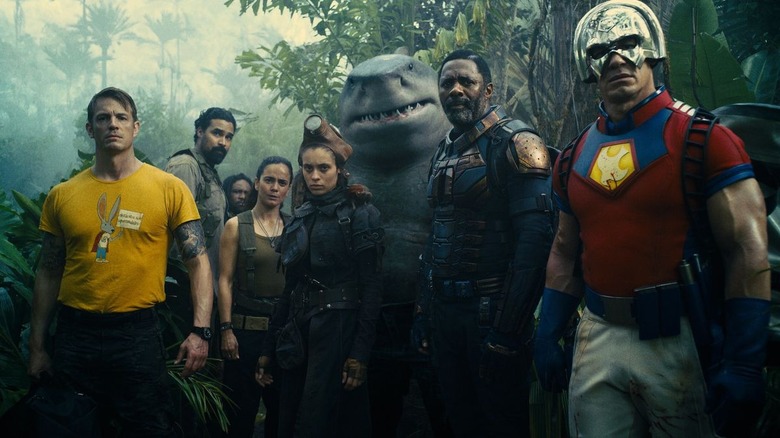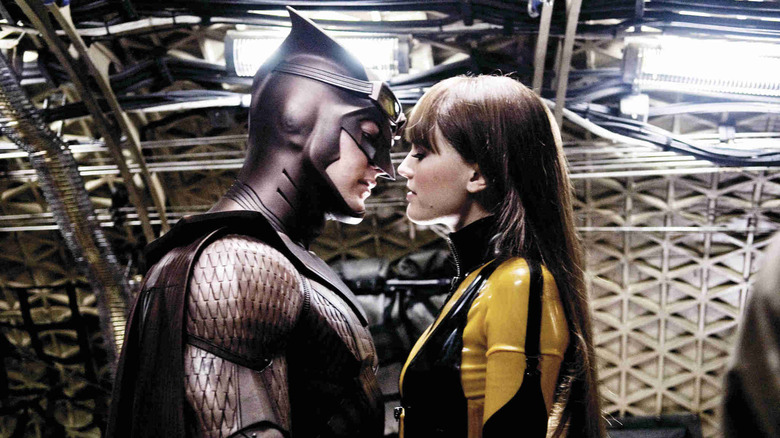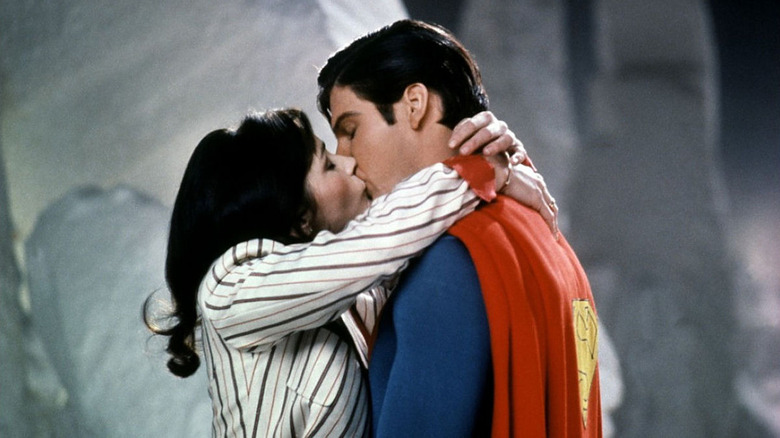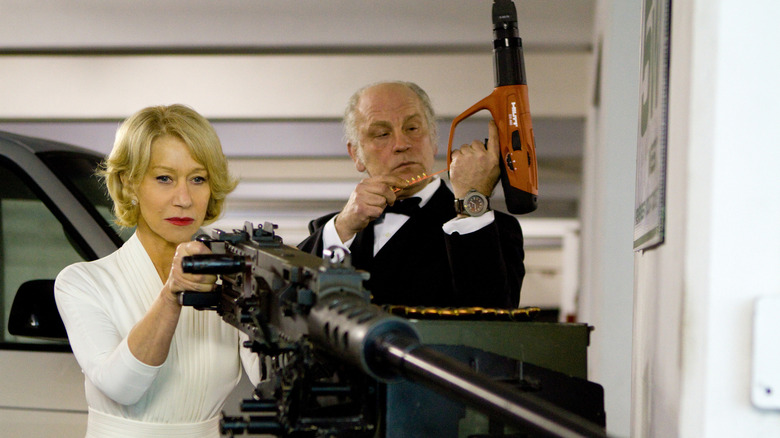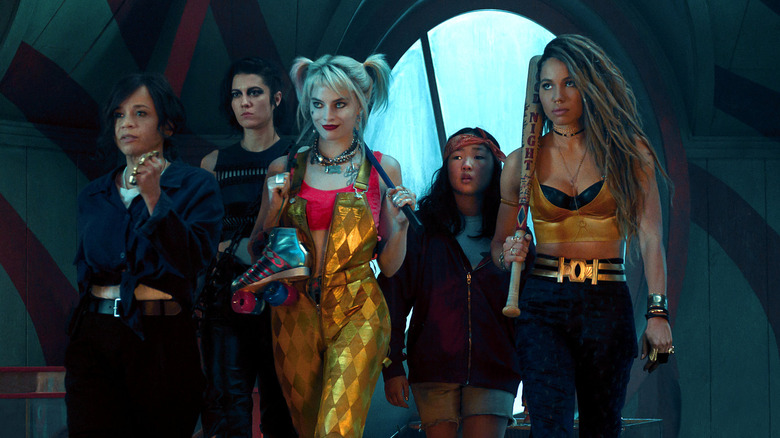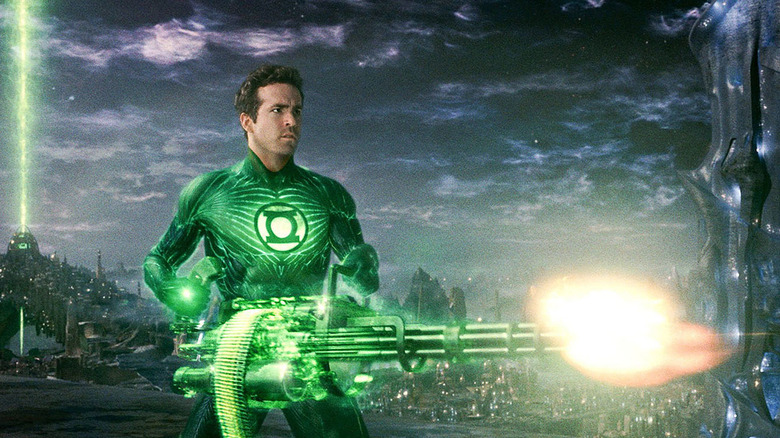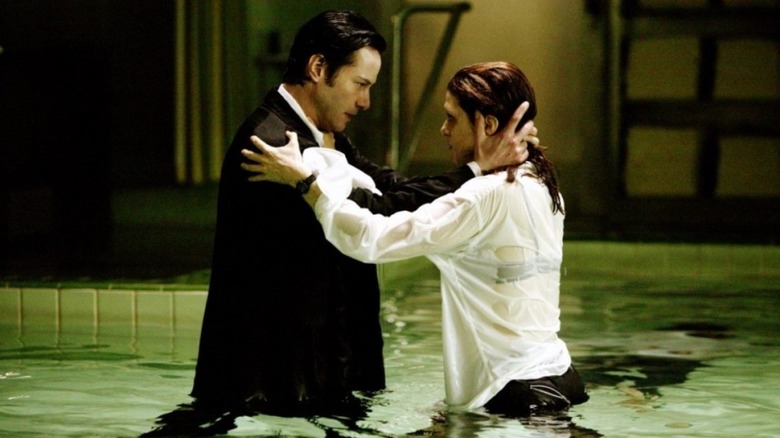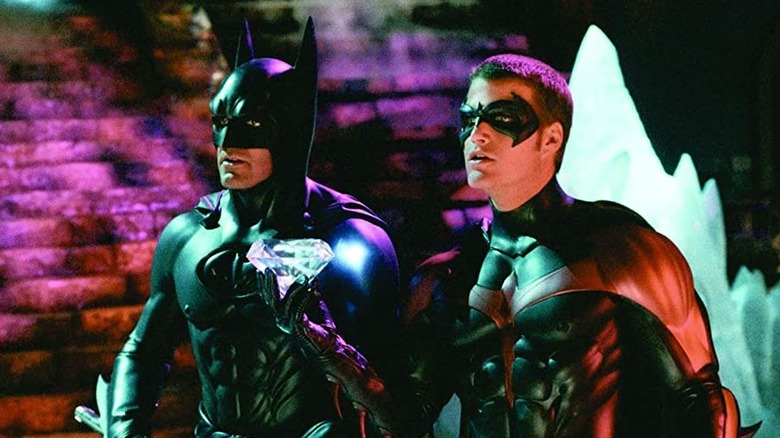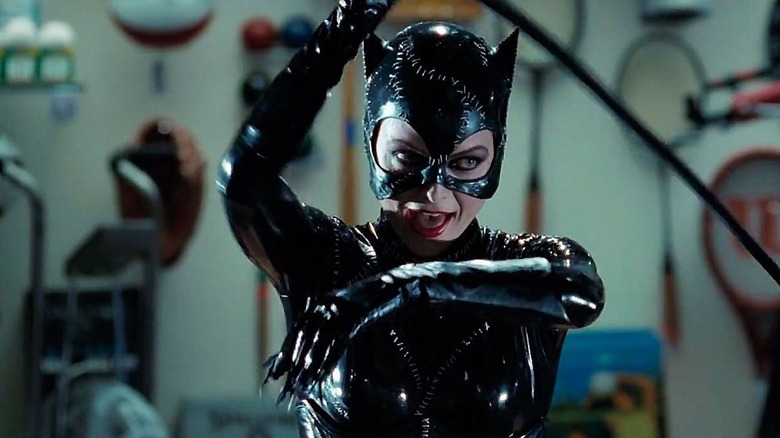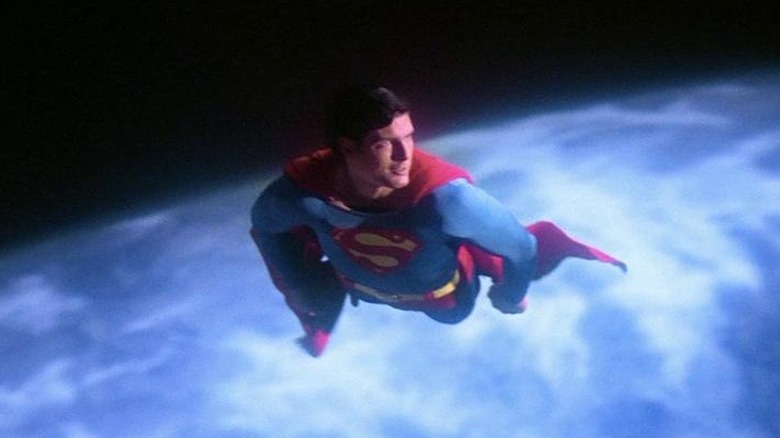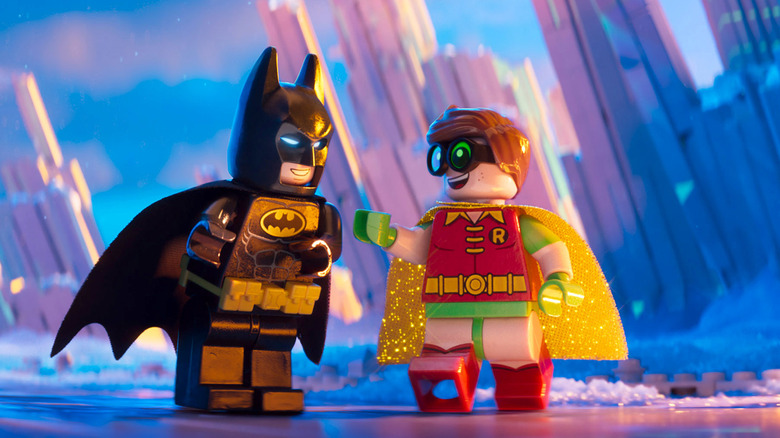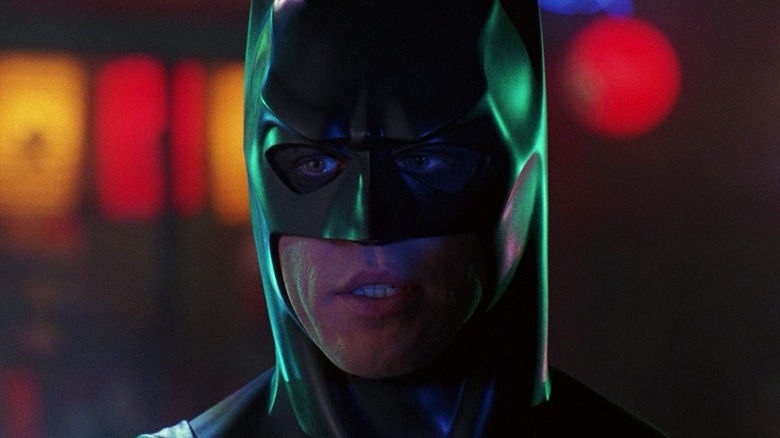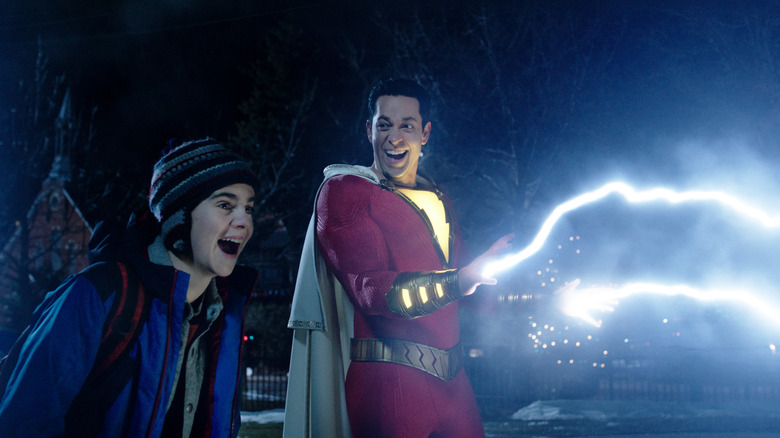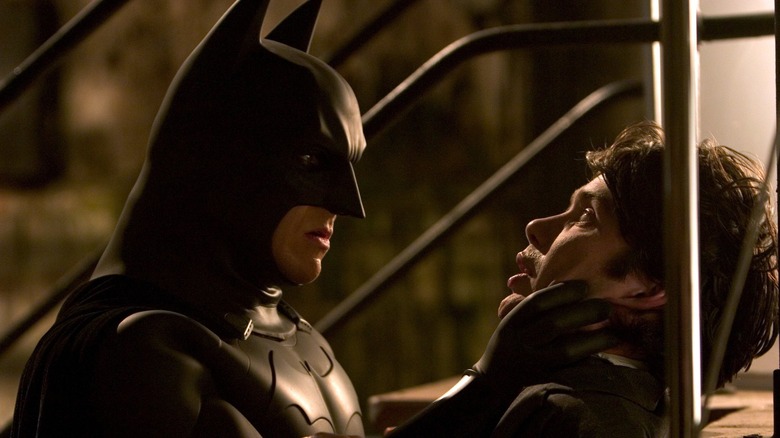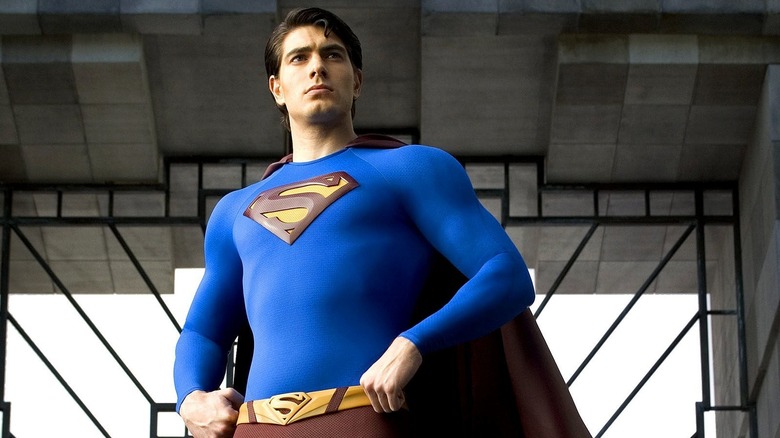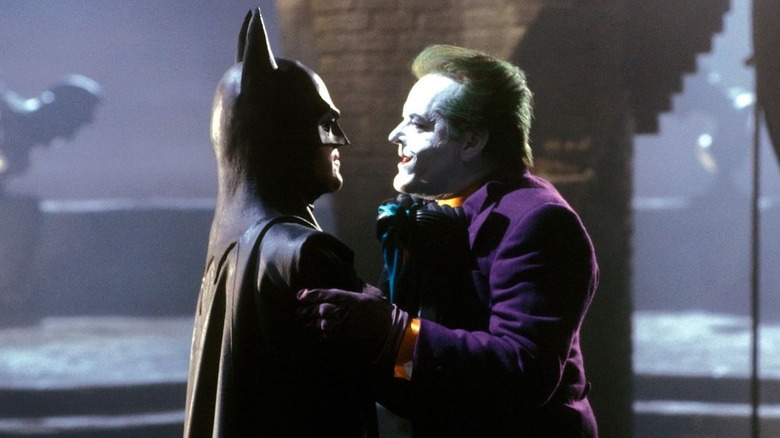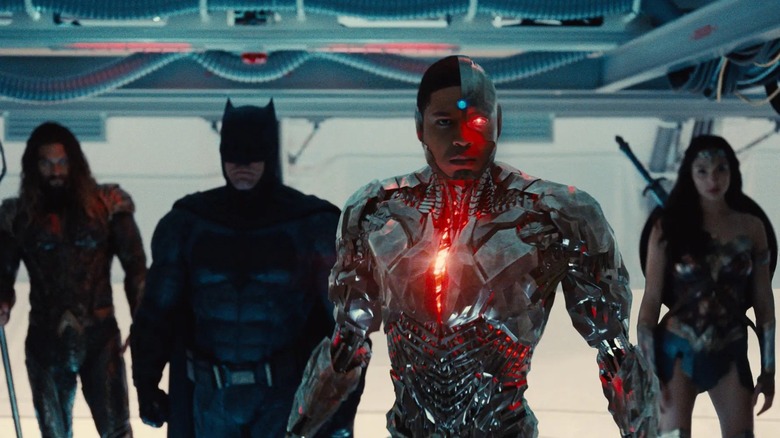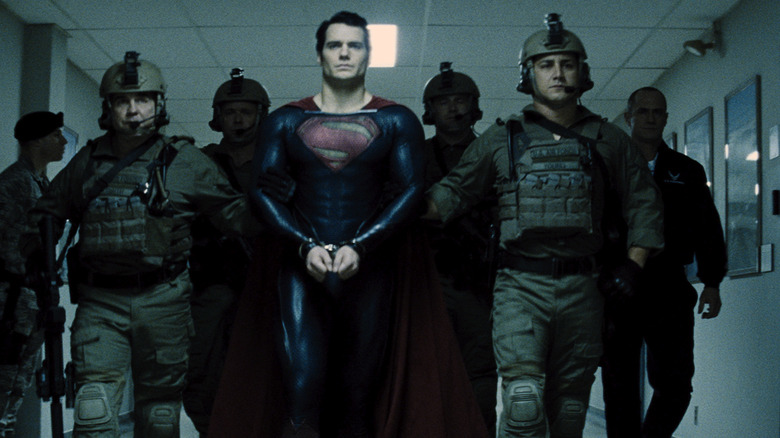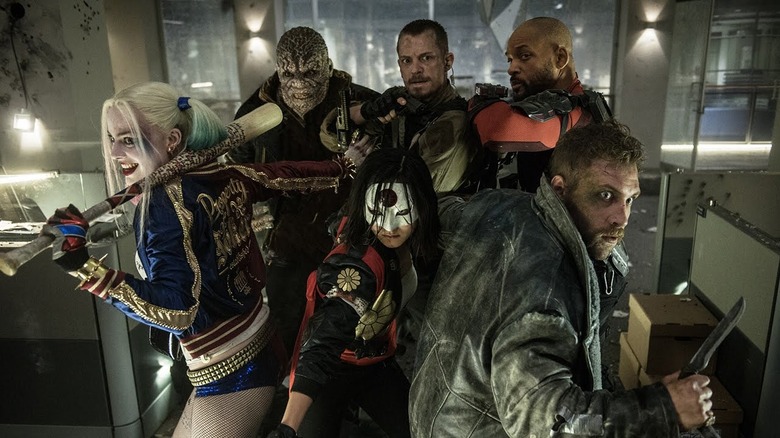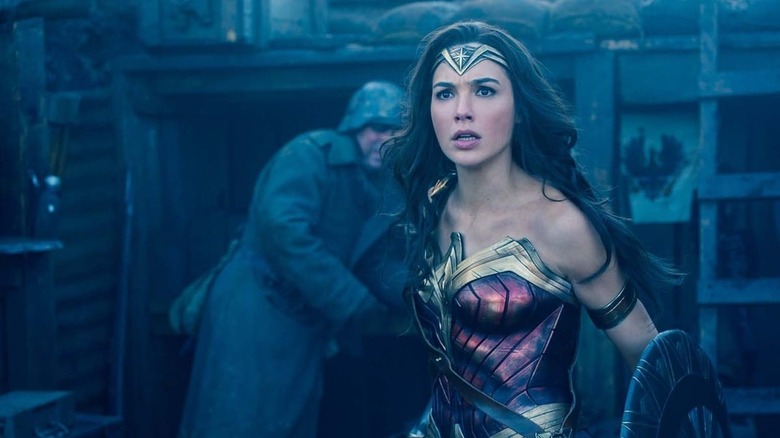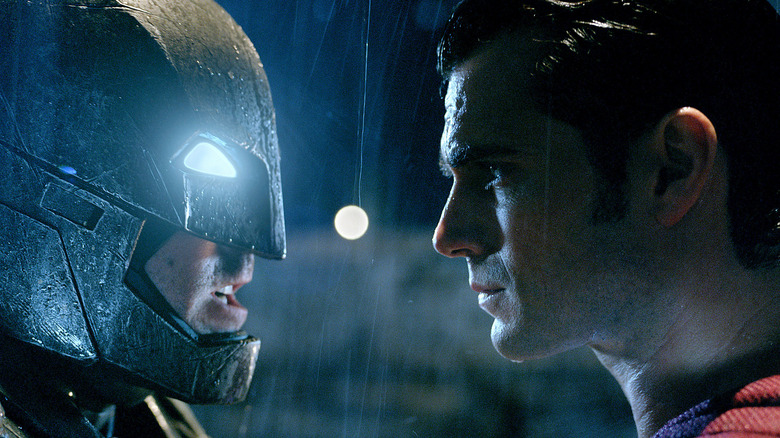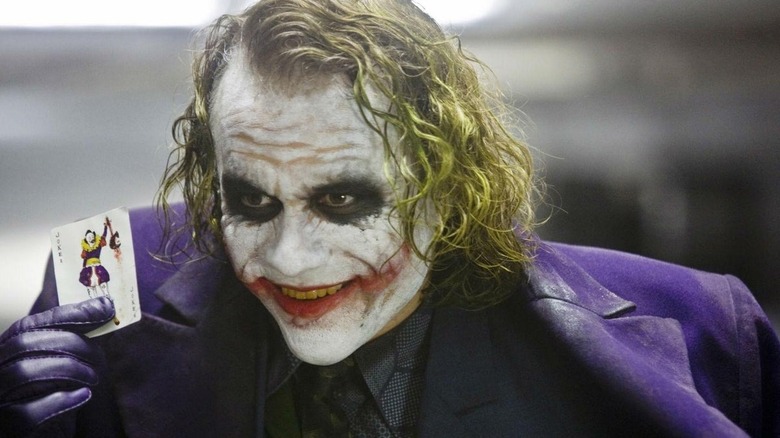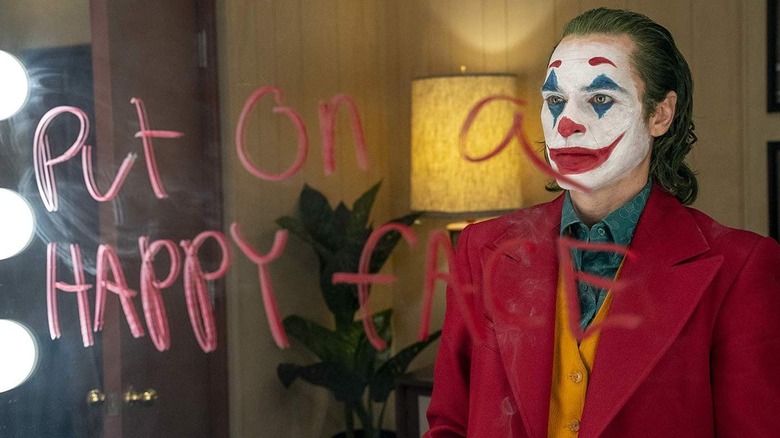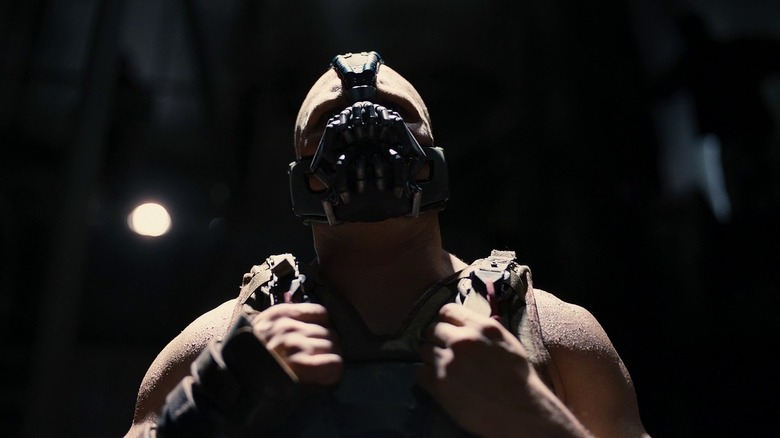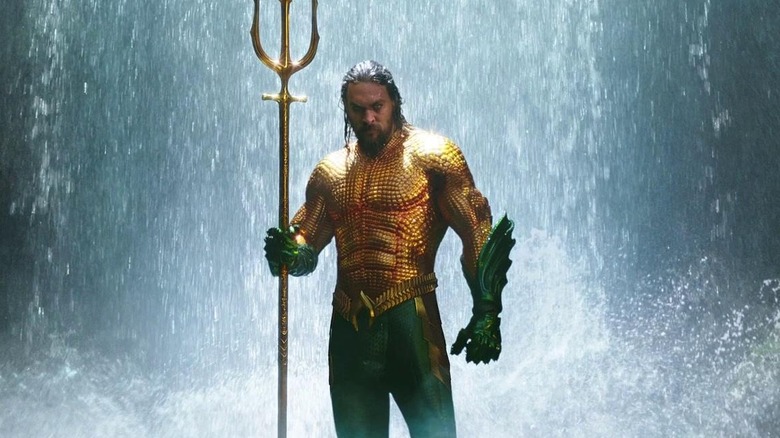Ranking DC Comics Movies By How Much They Made At The Box Office
To say that there have been a lot of movies based on DC Comics characters over the years would be a gross understatement. For decades, projects based on famous figures from this company have dominated multiplexes and become some of the biggest features in history. However, it isn't just "Batman" and "Superman" titles that make up the history of DC Comics on the big screen. There have also been film adaptations of stories from DC Comics imprints or one-off graphic novels, such as "V For Vendetta" or "Watchmen," that have also drummed up noteworthy box office figures. Wherever you look, your eyeballs are bound to land on some film rooted in DC Comics source material.
Even given the dense library of projects that count as DC Comics adaptations, there are still clear box office victors, losers, and everything in between. Depending on the decades in which the films have been produced, there have also been drastically different box office circumstances impacting their arrival. Ranking each DC Comics movie from lowest to highest-grossing at the worldwide box office doesn't just allow one to appreciate the factors that determine whether one of these movies becomes either an "Aquaman" or a "Jonah Hex." It also makes one realize just how many of them have emerged over the years, a testament to how many influential properties DC Comics has been associated with.
38. The Return of Swamp Thing
While no box office records have endured for the original 1982 "Swamp Thing" movie, financial figures have persisted for its sequel, "The Return of Swamp Thing." Released in 1989, this project ditched the original movie's director, Wes Craven, and its grim tone, in favor of lighthearted comedy, complete with Heather Locklear taking over the role of the titular character's love interest. But a way of broadening the appeal of this franchise ended up just sinking "Swamp Thing" to new financial lows.
"The Return of Swamp Thing" grossed just $274,928 worldwide and failed to crack the $200,000 mark in North America. Part of this dismal financial outcome can be attributed to a meager theatrical release, as the film was only released in 123 theaters in North America. A seven-year wait between "Swamp Thing" movies also didn't help this sequel out. Whatever the reason for its financial issues, "The Return of Swamp Thing" sank far below every other DC Comics movie adaptation at the box office.
37. Batman: The Killing Joke
"Batman: The Killing Joke" wasn't just an event because it was a feature-length adaptation of one of the most famous Batman graphic novels. It was also momentous because it was the rare direct-to-video animated DC Comics movie to also get a theatrical release. Initially created exclusively for the small screen, "Batman: The Killing Joke" ended up scoring a limited theatrical run courtesy of Fathom Events.
Though it only played a handful of days, "The Killing Joke" ended up grossing $4.3 million worldwide, $3.7 million of which came from its North American run. The enduring appeal of the original "Killing Joke" text — created in 1988 by Alan Moore and Brian Bolland — not to mention the excitement over seeing "Batman: The Animated Series" fixtures like Mark Hamill breathe new life into it, was enough to ensure people would show up to watch this direct-to-video movie on the big screen.
36. Batman: Mask of the Phantasm
Between 1989 and 1997, every single "Batman" movie released to theaters exceeded $200 million worldwide ... except for "Batman: Mask of the Phantasm." In sharp contrast to its brethren, the animated "Phantasm" grossed a measly $5.6 million in its 1993 theatrical run. Rather than being an indicator of the Batman franchise having run its course as a draw for big-screen moviegoers, this box office sum was merely related to the movie's subpar marketing campaign, which didn't give fans of either Batman or "Batman: The Animated Series" much notice of its existence.
Luckily for Warner Bros., "Phantasm" didn't cost too much to make and its box office troubles didn't derail the reputation of the series as a whole. The generally positive reception to this film has allowed it to endure as a cult favorite long after its box office run wrapped up, with some fans considering it among the best of the Bat's feature films to date.
35. Jonah Hex
Just a few months before the official release of "Jonah Hex," the YouTube channel ItsJustSomeRandomGuy created a satirical video involving conversations between action figures of Iron Man and Jonah Hex. In one of the final gags of the video, Iron Man turns to the DC Comics cowboy and asks him, "Does it feel prophetic that there was a trainwreck in your trailer?" It turns out this was very much a harbinger of what was to come, as "Jonah Hex" absolutely bombed at the box office.
Grossing just $11 million in its theatrical run, "Jonah Hex" fared so poorly in North America that its release was either scaled back or scrapped entirely in international territories. With minimal marketing to its name and trailers that echoed past box office bombs like "Wild Wild West," "Jonah Hex" was seemingly always doomed to be one of the worst performing DC movies. Truly, a trainwreck in every sense of the word.
34. Supergirl
Initially, the box office run for "Supergirl" looked like it was off to a promising start. The film debuted atop the domestic box office once it premiered in North America over Thanksgiving weekend 1984, earning $7.7 million. Such financial prosperity shouldn't have been a shock, given that the film was building off Christopher Reeve's take on Superman, still one of the most beloved silver screen superheroes ever.
Unfortunately, a toxic reception sank this one's long-term box office ambitions and "Supergirl" closed out its box office run with just $14.2 million worldwide. The bad reception from critics and audiences sealed its doom and ensured that "Supergirl" would fall far below all other "Superman" movies, including the widely-reviled "Superman IV: The Quest for Peace." Fortunately, Supergirl's fortunes would take a turn for the better decades later, when she starred in her own series as part of the Arrowverse that lasted six seasons.
33. The Losers
A full year before Chris Evans played one of the first Marvel Cinematic Universe superheroes, he was a part of the ensemble cast for the DC Comics adaptation "The Losers." Debuting in April 2010, "The Losers" also featured fellow future Marvel Cinematic Universe actors like Idris Elba and Zoe Saldana, as well as Jeffrey Dean Morgan. That made for a big cast, but it wasn't big enough to give the movie a lot of life at the box office. The film grossed only $29.8 million worldwide, putting it way behind its budget.
A key issue here was the decision to release the film just a few weeks before "Iron Man 2," which sucked up all the action movie oxygen in the room. It didn't help either that the marketing failed to establish unique details that could make the general public passionate enough about this material and turn "The Losers" into a box office winner.
32. Superman IV: The Quest for Peace
The most effective way to illustrate how much of a box office flop "Superman IV: The Quest for Peace" was is by comparing its financial intake to its predecessors. Worldwide, "The Quest for Peace" only grossed $36.7 million. Just six years before, "Superman II" hit $190.4 million globally, which "The Quest for Peace" would miss by 81%. That's to say nothing of the $300 million worldwide gross of the original "Superman" from nearly a decade earlier, while even "Superman III" fared better with an $80.2 million haul.
"The Quest for Peace" even managed to come in only $300,000 ahead of the North American cume of "Supergirl," despite having Christopher Reeve on hand to reprise his role as one of the most iconic superheroes ever. One need not spend forever wondering why this "Superman" title did so poorly at the box office. After all, "The Quest for Peace" got savage reviews and is still considered today one of the worst superhero movies ever.
31. Teen Titans Go! to the Movies
On Cartoon Network, the "Teen Titans Go!" TV show was a ratings juggernaut, a sleeper hit that managed to escape the shadow of the earlier "Teen Titans" TV program. The popularity of "Go!" proved so enormous that "Teen Titans Go! to the Movies" made its way to movie theaters in July 2018. Spectators were buzzing with curiosity over whether or not this feature would continue the franchise's successful streak. Unfortunately, "Teen Titans Go! to the Movies" only grossed $51.6 million worldwide, most of which came from a frontloaded North American haul.
Part of this may have come from the lack of appeal to non-kids in the film's marketing, as well as competition from other kid-friendly movies, like "Hotel Transylvania 3," playing at the same time. Still, the project was cheap enough to ensure that it wasn't a money loser for Warner Bros, and if nothing else, the franchise will always have those sizable TV ratings.
30. Superman III
For "Superman III," the Man of Steel got a new co-star in the form of Richard Pryor. The late comedian's participation served as an indicator that this franchise was headed into an overtly comedic direction and was also an attempt by the producers to secure some of the box office glory Pryor had achieved with his star vehicles.
Unfortunately, "Superman III" made considerably less than its predecessors with just $80.2 million worldwide in its 1983 theatrical run. "Superman III" didn't just come up short when compared to other "Superman" movies. Though it ended up the eighth biggest feature of 1983 globally, it came in behind cheaper projects like "Trading Places" and "Terms of Endearment." Even two competing James Bond movies, "Octopussy" and "Never Say Never Again," each outgrossed the latest adventure from the last son of Krypton. Despite clear maneuvers to maintain financial stability, "Superman III" was a fatal blow to the box office momentum of the "Superman" saga.
29. Catwoman
It just wasn't time for "Catwoman" in June 2004. As Halle Berry would say, it was "overtime." Debuting as a replacement for Warner Bros.' original planned summer 2004 blockbuster, an aborted version of "Batman vs. Superman," "Catwoman" only grossed $82 million globally. The problem here was pretty simple: "Catwoman" was utilizing a familiar character name but didn't build on the source material or performers that the general public was familiar with. Where was Gotham City or Michelle Pfieffer? Even the presence of a new performer like Berry in the lead role wouldn't have been an issue if the project had fit the mold of audience expectations for who Catwoman was.
With this critical error ingrained into the production's DNA, "Catwoman" was always doomed to come up short financially, despite having Berry fresh off her historic Best Actress win at the Oscars. But the presence of an acclaimed performer isn't enough to salvage a movie that misfires this badly at the box office, especially when it's "overtime."
28. V for Vendetta
Based on a graphic novel by Alan Moore and David Lloyd, "V for Vendetta" was a politically incendiary feature that had the potential to come up short at the box office for Warner Bros. Pictures. Would audiences find all the weighty sociopolitical messaging too hefty for an action movie? Would they show up for a film whose main character wears a mask the entire time? It turned out that "V for Vendetta" resonated with people just fine with its social commentary and masked antihero intact.
The feature grossed $130.2 million worldwide, nearly triple its $50 million budget. A distinctive marketing campaign, not to mention leaning on the presence of "Matrix" directors Lana and Lilly Wachowski as producers, gave this one a solid footing with the general public. Though its box office run was solid, "V for Vendetta" proved especially successful in merchandising, with the Guy Fawkes mask making Warner Bros. tons of cash years after the film's 2005 theatrical debut.
27. Red 2
The original "Red" turned into a sleeper hit in 2010, getting a lot of mileage out of combining Helen Mirren with guns as well as the scarcity of big movies headlined by people over the age of 60. Something else that helped? Opening in mid-October. In this area, "Red" had little action movie competition, even if it was headlined by Bruce Willis, Mary-Louise Parker and John Malkovich, in addition to the ageless Mirren.
By contrast, "Red 2" opened in the far more competitive mid-July timeframe in 2013. Having to grapple with far more action movies in theaters, as well as more mixed reviews than its predecessor, "Red 2" grossed just $148.1 million. While not a disastrous sum, this was noticeably beneath its predecessor and not enough to make the production profitable. With this installment, the box office potential of the "Red" series went into a nap it never woke up from.
26. Wonder Woman 1984
There was a time when it would have been easy to imagine "Wonder Woman 1984" as a $1 billion-plus grosser at the worldwide box office. After all, the original film was a beloved title that cracked $800 million globally with ease. Unfortunately, the COVID-19 pandemic happened the same year "Wonder Woman 1984" was preparing to hit theaters. After constant delays, "Wonder Woman 1984" finally debuted on December 25, 2020, six months later than originally planned and, in the United States, with a simultaneous HBO Max debut.
The widespread closure of movie theaters and getting dropped onto a streaming platform ended up hurting the box office potential of "Wonder Woman 1984" significantly. The project only grossed $166.3 million worldwide, including just under $50 million in North America. Considering that the movie could never play in more than 2,218 theaters in the domestic marketplace, along with all the unique pandemic-era factors it had to deal with, it wouldn't be fair to dub this movie a traditional "bomb." Instead, this feature became yet another demonstration of how much the theatrical exhibition space was upended by the COVID-19 pandemic.
25. The Suicide Squad
After the original "Suicide Squad" proved financially successful but was critically trashed, Warner Bros. brought out the big guns for a sequel. "Guardians of the Galaxy" writer-director James Gunn was hired to revamp the property with a whole new look and feel. But going in such a bold direction in the hopes of securing the box office glory of the "Guardians of the Galaxy" films didn't quite pan out for "The Suicide Squad."
The film grossed just $167.1 million worldwide, a steep decline from the $745.4 million worldwide gross of the original "Suicide Squad" and also flat-out terrible for a movie that cost $185 million to make. Part of this could be laid at the feet of simultaneously launching "The Suicide Squad" on HBO Max in the United States. However, the bigger culprit was the lingering negative reception of the original movie and a lackluster marketing campaign from Warner Bros. Whatever the reason, "The Suicide Squad" couldn't come up with box office figures as impressive as its critical reception.
24. Watchmen
Hot off turning the graphic novel "300" into a pop culture phenomenon, all eyes were on director Zack Snyder to see if he could make lightning strike twice with "Watchmen." Based on source material largely deemed impossible to film, could Snyder also turn this one a box office sensation? The answer turned out to be "no," though "Watchmen" wasn't without its box office achievements.
Most notably, the feature got off to one of the biggest domestic openings in history for an R-rated film at the time of its March 2009 premiere. Unfortunately, it proved significantly frontloaded, as seen by its 67% second weekend drop. The project didn't also hold much appeal for international moviegoers, as overseas grosses failed to crack $100 million. Grossing $186.9 million globally on a $120 million budget, "Watchmen" couldn't quite turn a profit, even if its box office sum was better than some might have expected.
23. Superman II
There was no way a "Superman" sequel could hope to match the box office haul of its predecessor. The hubbub surrounding the prospect of seeing a big-budget live-action version of Superman on the big screen for the first time could never be replicated. Much like with 1989's "Batman" years later, there was nowhere to go but down at the box office once you delivered something audiences had been waiting so long for.
But that didn't mean "Superman II" was doomed to failure, as the feature still took in a robust $190.4 million globally, enough to make it the third-biggest movie of 1981 worldwide. It wasn't as wildly profitable as "Superman," but "Superman II" was a hit in its own right. The film also became something of a cult item, with fans clamoring for years for an alternate cut of the film by director Richard Donner, who was removed from "Superman II" halfway through filming. The so-called "Donner Cut" was finally released in 2006.
22. Red
It took the DC Comics adaptation "Red" ages to make it from script to screen, with DC parent company Warner Bros. repeatedly passing on the property and finally letting the writers take it to other studios. But once it arrived in theaters, it proved to be a solid box office performer. In its worldwide run, the feature grossed $196.4 million, enough to make it plenty profitable. Even better, it also was one of the biggest live-action films Bruce Willis had headlined in the 21st century up to that point.
Pairing proven action star Willis with a murderer's row of dramatic performers like Helen Mirren, John Malkovich, Brian Cox, Richard Dreyfuss, and Morgan Freeman, many of them doing ludicrous action material, ended up being a massive draw for moviegoers across the planet. The development process for "Red" lasted forever, but the box office figures prove the wait was well worth it.
21. Birds of Prey
Before 2020, every DC Extended Universe movie had cracked $360 million worldwide and only "Shazam!" had ended up beneath $655 million globally. While "Birds of Prey" ended that streak, it's worth noting that the film was likely made with the recognition that it wouldn't be the next "Aquaman" either. Armed with an R rating and an $82 million budget (considerably less than all other DC Extended Universe titles), "Birds of Prey" was built from the ground up to not require gargantuan box office numbers to be profitable.
In its worldwide box office run, somewhat cut short by the COVID-19 pandemic, "Birds of Prey" grossed $201.9 million. The hopes of this being the next "Deadpool," a low-budget R-rated superhero movie that took off like a rocket financially, never transpired, but "Birds of Prey" also didn't do terribly. If nothing else, its box office shortcomings feel more forgivable, considering it ended up making more than significantly costlier "The Suicide Squad."
20. Green Lantern
Today, "Green Lantern" has become a punchline thanks to how often its leading man, Ryan Reynolds, has made fun of it in subsequent projects like "Deadpool." But while the character's CG suit and strange choice to set its story primarily on Earth are worthy of scorn, it's also best to remember that "Green Lantern" wasn't just a failure artistically. It was also a massive box office bomb that killed off an early attempt to make an interconnected cinematic universe of DC Comics adaptations.
Dropping into movie theaters in June 2011 with a $200 million budget, "Green Lantern" grossed a dismal $219.5 million worldwide. That was less than half of the global haul for that same summer's "Thor" and nowhere near enough to cover the film's exorbitant costs. Atrocious reviews and a messy marketing campaign sank this one's chances of ever turning a profit. The eventual legacy of "Green Lantern" was that it paved the way for a bunch of jokes in "Deadpool."
19. Constantine
Yes, it's true, the live-action "Constantine" movie isn't super faithful to the original DC Comics character of the same name. However, that didn't stop moviegoers from showing up in solid numbers to see the picture when it dropped into theaters in February 2005. Through its worldwide run, "Constantine" ended up securing $221.5 million, or just a hair under three times its budget.
Even better, it was a solid performer for its leading man, Keanu Reeves, as "Constantine" became one of the biggest non-"Matrix" movies ever for the actor at the time of its release. Being one of the first action vehicles for Reeves after the "Matrix" trilogy wrapped up and launching it outside of the summer blockbuster season proved to be critical to "Constantine" becoming a successful, if not entirely faithful, DC Comics feature. Although there was talk of a sequel — even as recently as 2020 — "Constantine 2" never materialized.
18. Batman and Robin
Needless to say, "Batman and Robin" didn't quite work as it needed to at the box office. After "Batman Forever" provided a jolt of life to the franchise at the box office — following the disappointing returns for 1992's "Batman Returns" — the expectations were that "Batman and Robin" could keep the good times rolling financially. Instead, the film grossed just $238.3 million worldwide, nowhere near enough to make this $125 million-budgeted movie a profitable venture.
Even worse, it was one of the first times a live-action "Batman" movie didn't rise towards the top of the yearly worldwide box office chart. "Batman and Robin" was only the 14th biggest movie of 1997 worldwide, coming in behind projects like "Face/Off" and "Bean." The negative response to "Batman and Robin" was enough to not only ensure that it was a box office bomb, but that the "Batman" series would go into dormancy for nearly a decade.
17. Batman Returns
"Batman Returns" is a bit of an odd duck (or penguin, if you prefer) in terms of its box office performance. At first glance, it would appear that the film was an unqualified hit. Just look at its domestic box office run, which kicked off with this Tim Burton movie setting a new record for an opening weekend in North America, dethroning the 1989 "Batman" for that honor. "Batman Returns" would eventually gross $266.8 million worldwide, making it the sixth biggest movie of 1992 globally while its $162.8 million North American cume was enough to make it the second-biggest title of the year at home.
However, "Batman Returns" ended up making roughly 37% less than the 1989 "Batman" movie at the worldwide box office, while having a price tag that was more than double the $35 million cost of its predecessor. Viewed through this lens, even the sizeable returns of "Batman Returns" couldn't help but seem underwhelming.
16. Superman
In 1978, the world had never seen a proper live-action "Superman" movie. In an age where everyone from the Eternals to Ratcatcher can headline big comic book movies, that may sound impossible, but until director Richard Donner's "Superman" arrived, that was the reality moviegoers lived with. Once Christopher Reeve's take on the character — which is still held up as the gold standard — flew across the silver screen, though, there was no way anything would ever be the same.
"Superman" kicked off its theatrical run with one of the largest domestic opening weekends up to that point, before proceeding to make $300.2 million worldwide, a sensation haul and well above its $55 million price. The novelty of being the first "Superman" film of its kind would always have given this title a boost at the box office, but what led "Superman" soaring to such financial heights was how this movie resonated deeply with moviegoers of all ages.
15. The Lego Batman Movie
While "Batman" movies have trended dark and gritty in the 21st century, "The Lego Batman Movie" ran, not walked, in the opposite direction. This spin-off of the 2014 hit "The Lego Movie" was bursting with bright colors and energy, while also being a hyperactive rainbow-colored ode to the expansive Batman mythos. "The Lego Batman Movie" was also a box office hit, albeit not quite as big as "The Lego Movie." Still, its $310.5 million worldwide box office gross was a great sum that even managed to surpass the global hauls of past live-action blockbusters starring the Caped Crusader, like "Batman Returns."
Residual goodwill from "The Lego Movie" was key to this one's theatrical success, as was the general public's love for all things Batman. Departing from the tonal norms of modern "Batman" features didn't hinder "The Lego Batman Movie" from seizing a heroic box office gross.
14. Batman Forever
After "Batman Returns" sharply decreased from 1989's "Batman" at the worldwide box office, Warner Bros. was desperate to get the franchise back on track financially. For the third installment, "Batman Forever," the plan to return to the franchise's box office glory days entailed hiring a new director, Joel Schumacher, embracing a lighter tone, and bringing in box office draw Jim Carrey as Edward Nygma/The Riddler. It didn't take long for Warner Bros. to discover if this plan to revitalize the series had worked or not, as "Batman Forever" managed to topple "Jurassic Park" for the record of domestic biggest opening weekend in history once it hit theaters in 1995.
This continued the trend of its two predecessors, both of which also set North American opening weekend records. From there, "Batman Forever" grossed $336.5 million worldwide, still down from the 1989 "Batman" film but a noticeable improvement from "Batman Returns" by almost 50 percent. With this achievement, Warner Bros. had gotten the "Batman" movies back on firmer financial footing.
13. Shazam!
"Shazam!" wasn't just another installment in the DC Extended Universe. It was also an attempt to inject something with a more modest budget and a distinctly family-friendly tenor into the generally dark DC canon. With these aspirations built into its DNA, "Shazam!" ended up becoming a solid box office performer with a $363.6 million worldwide gross. This performance was especially impressive given the $85 million budget, as well as its April 2019 release date, which placed "Shazam!" directly in between Marvel Cinematic Universe megahits "Captain Marvel" and "Avengers: Endgame."
"Shazam!" was able to thrive against that competition thanks to a marketing campaign that emphasized a spry and fun atmosphere as well as a kid-friendly wish-fulfillment central concept that's always been integral to this character's appeal. While not the biggest entry in the DC Extended Universe in terms of global box office, "Shazam!" was still a profitable and successful venture that proved the DC Extended Universe could be home to more than just grim $200 million-plus action blockbusters.
12. Batman Begins
In June 2005, Batman was the underdog at the summertime box office. It had been eight years since the character's last theatrical release and that title, "Batman and Robin," had left such a sour taste in the public's mouth that something drastic would need to be done to regain the trust of moviegoers. The solution was to hire director Christopher Nolan to deliver a gritty and realistic take on the character, starring Christian Bale and chronicling Batman's origins in a live-action film for the first time.
Initially, it seemed like "Batman Begins" was off to a muted start in North America, but strong holds week-to-week afterward ensured that it would eventually crack $200 million in that territory. That made it only the second "Batman" feature to exceed that threshold domestically, while its $358.8 million worldwide haul put it, at the time of its release, behind only 1989's "Batman" in terms of global grosses in this franchise. With these accomplishments, "Batman Begins" officially revived the Dark Knight as a box office commodity.
11. Superman Returns
At a glance, "Superman Returns" would seem to be a solid box office performer. It didn't smash any records, but this Brandon Routh star vehicle did surpass all other "Superman" titles at the worldwide box office with a $391 million sum. Meanwhile, it also edged past "Batman Begins" from one year earlier globally. All signs seemed to point towards "Superman Returns" being an impressive hit, considering it was also the first movie starring the character in nearly 20 years.
Unfortunately, "Superman Returns" cost a staggering $263 million to make, compared to the $150 million price tag of "Batman Begins." Similarly, "Superman Returns" also came in behind the global total of director Bryan Singer's "X-Men 2" from three years earlier and was nowhere near as big as other superhero titles like the "Spider-Man" features. Given these factors, it becomes more understandable that "Superman Returns" never spawned a sequel, with Warner Bros. opting to reboot the series seven years later with "Man of Steel."
10. Batman
When Michael Keaton was first cast as Batman, people weren't happy. There was all kinds of controversy over a comedic actor taking on the part. Perhaps in an alternate universe, all this hullaballoo sank the first attempt to translate Batman into the mold of an action-packed live-action blockbuster. In this universe, though, all of that fan disappointment quickly vanished once the movie debuted in theaters in June 1989 and immediately become a box office sensation beyond anyone's predictions.
Shattering the domestic opening weekend record, "Batman" would go on to reach $100 million in North America at a record pace before finishing its global box office run with a massive $411.6 million. It would take nearly two decades for any other "Batman" or DC Comics movie adaptation to surpass the 1989 "Batman" film as the biggest film ever in both categories. Looks like that Michael Keaton casting didn't alienate moviegoers after all.
9. Justice League
Under any other circumstances, a $655.9 million worldwide gross for any single movie would be a reason for celebration. Unfortunately, that global haul wasn't nearly enough for the 2017 blockbuster "Justice League." Simply on profitability alone, with "Justice League" costing $300 million to make, the film would need to make much more than $655.9 million to start showing anything near a profit. Worse, the film made less than previous DC Extended Universe titles like "Man of Steel" and "Wonder Woman," both of which weren't headlined by six superheroes.
Bringing together so many DC Comics icons into one movie — if Marvel's "The Avengers" was any indicator — should have resulted in a far bigger box office success than this. However, the divisive nature of its predecessor, "Batman v Superman: Dawn of Justice," and the flow of news about its troubled production — not to mention holiday season 2017 competition from "Thor: Ragnarok" and "Star Wars: The Last Jedi" — ensured that "Justice League" would become a box office disappointment even with a worldwide gross north of $655 million.
8. Man of Steel
"Man of Steel" hit theaters in June 2013 hoping to capture lightning in a bottle. Would this movie be for the "Superman" franchise what "Batman Begins" had been to "Batman" movies? Both films were hewing close to grim and realistic tones while also employing the name of Christopher Nolan in their respective marketing campaigns (though he was only producing "Man of Steel"), all in the hopes of relaunching a once-bulletproof superhero movie series.
Though it wasn't quite as critically acclaimed as "Batman Begins," "Man of Steel" did work out well at the box office, as indicated by its North American opening weekend setting a new record for a June debut. Its worldwide total would end up tallying $667.9 million, a 72% increase on the global haul of "Superman Returns" while costing a bit less to produce. There was no doubt: "Man of Steel" had brought back Superman as a box office force to be reckoned with.
7. Suicide Squad
Just four months after "Batman v. Superman: Dawn of Justice" debuted, the DC Extended Universe delivered its third title, "Suicide Squad," which shifted the action away from A-list superheroes like Superman and Batman and onto more obscure villains from the DC Comics mythos. The end result was a feature that got trashed by critics, but did end up scoring a sizeable haul at the global box office, perhaps thanks in part to the presence of Will Smith and the scene-stealing Margot Robbie as Harley Quinn.
In its theatrical run, "Suicide Squad" grossed $745.4 million worldwide, a figure made all the more impressive considering "Suicide Squad" never got released in China, a territory that contributed a hefty $95.7 million to the box office haul of "Dawn of Justice." Unforgettable marketing materials and the presence of A-list actors like Smith, Robbie, Viola Davis, and Jared Leto ensured that "Suicide Squad" would keep the box office good times rolling for the DC Extended Universe.
6. Wonder Woman
Before "Wonder Woman," the DC Extended Universe had produced three box office smash hits, but none of them had been very successful critically. This saga needed a big beloved crowdpleaser and it got just that with "Wonder Woman." Not only was this film hailed as something special by critics, and a game-changer for a male-dominated genre, but it also became a massive box office hit.
Domestically alone, "Wonder Woman" surpassed all other DC Extended Universe titles with a $410 million haul, while also grossing more than all but two entries in the Marvel Cinematic Universe up to that point. Worldwide, the first live-action solo outing for DC's original female superhero continued to be an impressive box office performer with an $818 million global haul. Fittingly for this particular character, "Wonder Woman" managed to swoop in and save the day for the DC Extended Universe at the box office.
5. Batman v Superman: Dawn of Justice
In March 2016, the time had finally come for the ultimate showdown. The DC Extended Universe was about to explode wide open with "Batman v Superman: Dawn of Justice," the first time that Batman and Superman would interact in a live-action feature. This was a sizeable motion picture meant to not only redefine the worlds of these two superheroes but also introduce further DC Comics heavyweights like Wonder Woman and The Flash to the general public.
The box office results of all this ambition was a film that immediately took off with what was the biggest March domestic opening weekend at the time of its release. Once the dust had cleared and all the dollars had been counted, "Dawn of Justice" accumulated $872.3 million from worldwide audiences. Even with that massive figure, this box office performance was criticized in some circles for failing to hit $1 billion worldwide, as well as its steep weekend-to-weekend declines in North America. Still, an $872.3 million gross is nothing to sneeze at and reflected the enormous excitement surrounding the prospect of a tussle between two DC Comics titans.
4. The Dark Knight
Before "The Dark Knight" hit theaters in July 2008, not a single theatrical adaptation of a DC Comics property had exceeded $500 million globally. That would change promptly with this "Batman Begins" sequel, which not only smashed through $500 million, but managed to eventually exceed $1 billion at the worldwide box office. That was in addition to setting all kinds of box office records, including the title for largest North American opening weekend.
While "Batman Begins" garnered enough positive responses to make it seem possible that a sequel would be even more successful, "The Dark Knight" proved so lucrative that it was clear additional factors were at play. Key among those was Heath Ledger, whose portrayal of the Joker landed him a posthumous Oscar — a first for this genre. The actor's sudden passing, six months before "The Dark Knight" reached theaters, transformed this project from just a superhero movie into a must-see swan song for a gifted artist gone too soon. Throw in exceptionally good reviews and it's no wonder "The Dark Knight" rewrote the book on what DC Comics adaptations could accomplish at the box office.
3. Joker
Being based on one of the biggest comic book villains ever, DC Comics or otherwise, was always going to give "Joker" a leg up at the box office. However, there was some trepidation surrounding its box office prospects since, unlike most other comic book movies, "Joker" was an R-rated production and not an action movie. But any concerns about its unorthodox qualities alienating moviegoers vanished once "Joker" laughed up the biggest October opening weekend in history at the domestic box office.
The box office good times didn't stop there, though, as "Joker" also turned out to be a massive draw in international territories. In its entire theatrical run, "Joker" grossed $1.072 billion worldwide, an astonishing sum that also made this the first R-rated motion picture in history to exceed the $1 billion mark at the box office. Perhaps no feat better represents how much "Joker" exceeded expectations than the fact that its haul was right on par with the global box office gross of the significantly costlier PG-13 tentpole, "Star Wars: The Rise of Skywalker." Needless to say, "Joker" went from being a box office wild card to an ace in the hole.
2. The Dark Knight Rises
Four years after "The Dark Knight," Christopher Nolan returned to direct a second follow-up to "Batman Begins," starring Christian Bale as the title character. Following up on all the hype generated by the record-shattering box office run of "The Dark Knight," enormous excitement surrounded the film's release in July 2012. This translated into "The Dark Knight Rises" scoring $1.082 billion worldwide, a hefty sum that surpassed the global haul of "The Dark Knight."
This film also achieved something unique for a title in the "Batman" franchise, as this became the first installment in the series to make far more internationally than it did domestically. The days of "Batman and Robin" making only $121 million in foreign countries were a distant memory once "The Dark Knight Rises" showed up with a hefty $634 million from those same territories. Even with enormous financial expectations on its shoulders, "The Dark Knight Rises" had no trouble impressing at the box office.
1. Aquaman
For years, Aquaman was a punching bag. A go-to source of mockery on pop culture properties ranging from "The Big Bang Theory" to "Family Guy," Aquaman was never seen as being as cool or popular as fellow DC Comics mainstays like Batman or Wonder Woman. However, all those comments got dialed way down once the 2018 blockbuster "Aquaman" hit theaters and proved to be not just a box office juggernaut, but the biggest DC Comics adaptation in history at the worldwide box office.
This achievement came about thanks to a $1.148 billion global haul, much of which came from an $812.6 million international total that, all on its own, surpassed the worldwide box office gross of past DC Extended Universe titles like "Suicide Squad." Resonating with foreign moviegoers, including Chinese audiences who contributed over $295 million to its box office gross, was critical to making "Aquaman" such a gargantuan success. With those accomplishments, Aquaman went from being a punchline to a movie star like no other in the DC pantheon.
